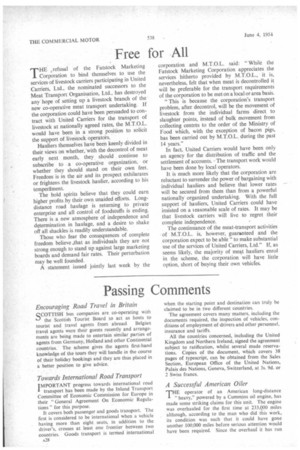Free for All
Page 30

If you've noticed an error in this article please click here to report it so we can fix it.
THE ,refusal of the Fatstock Marketing Corporation to bind themselves to use the services of livestock carriers participating in United Carriers, Ltd., the nominated successors to the Meat Transport Organisation, Ltd., has destroyed any hope of setting up a livestock branch of the new co-operative meat transport undertaking. if the corporation could have been persuaded to contract with United Carriers for the transport of livestock at nationally agreed rates, the M.T.O.L. would have been in a strong position to solicit the support of livestock operators. Hauliers themselves have been keenly divided in their views on whether;with the decontrol of meat early next month, they should . continue to subscribe to a co-operative organization, or whether they should stand on their own feet. Freedom is in the air and its prospect exhilarates or frightens the livestock haulier, according to his temperament.
The bold spirits believe that they could earn higher profits by their own unaided efforts. Longdistance road haulage is returning to private enterprise and all control of foodstuffs is ending. There is a new atmosphere of independence and determination in haulage, and a desire to shake off all shackles is readily understandable.
Those who fear the consequences of complete freedom believe .that as individuals they are not strong enough to stand up against large marketing boards and demand fair rates. Their perturbation may be well founded.
A statement issued jointly last week by the corporation and M.T.O.L. said: "While the Fatstock Marketing Corporation appreciates the services hitherto provided by M.T.O.L., it is, nevertheless, felt that when meat is decontrolled it will be preferable for the transport requirements of the corporation to be met on a local or area basis.
"This is because the corporation's transport problem, after decontrol, will be the movement of livestock from the individual farms direct to slaughter points, instead of bulk movement from collecting centres to the order of the Ministry of Food which, with the exception of bacon pigs, has been carried out by M.T.O.L. during the past 14 years."
In fact, United Carriers would have been only an agency for the distribution of traffic and the settlement of accounts. The transport work would have been done by local operators.
It is much more likely that the corporation are reluctant to surrender the power of bargaining with individual hauliers and believe that lower rates will be secured from them than from a powerful nationally organized undertaking. With the full support of hauliers, United Carriers could have insisted on a teasonable scale of rates. It may be that livestock carriers will live to regret their complete independence.
The continuance of the meat-transport activities of M.T.O.L. is, however, guaranteed and the corporation expect to be able "to make substantial use of the services of United Carriers, Ltd." If, as seems likely, the majority of meat hauliers enrol in the scheme, the corporation will have little option, short of buying their own vehicles.












































































































